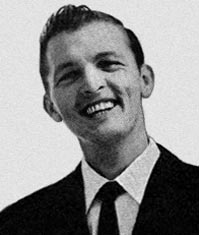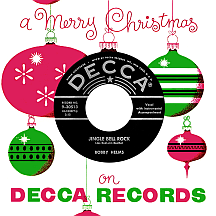BOBBY HELMS
Jingle Bell Rock
Rock and roll and Christmas collided in 1957. It was inevitable; the preferred music of '50s youth, borne of country, rhythm and blues and other influences, simply could not avoid crossing paths with the longer-held tradition of singing carols commemorating the birth of Baby Jesus or simply extolling the joys of spending the first days of winter in a cold weather setting with loved ones, anticipating the sound of reindeer hooves on the roof. Some early rockers had previously ventured into seasonal music, The Drifters' R&B take on "White Christmas" in 1954 being an early hit, The Gypsies' 1955 Groove label single "Rock Around the Christmas Tree" a lesser-known example. But it was in 1957 that Elvis Presley welcomed the yuletide into his repertoire with soon-to-be classics like the bouncy "Santa Bring My Baby Back (To Me)," bluesy "Santa Claus is Back in Town" and best-of-the-bunch "Blue Christmas." Yet the seasonal song of '57 with the greatest staying power was by Bobby Helms, an appropriately positive (if not entirely comprehensible) song about '...snowin' and blowin' up bushels of fun,' a time-proven classic called "Jingle Bell Rock."
Long before the rockin' holiday bug bit Bobby, he was performing on the Monroe County Jamboree in and around his hometown, Bloomington, Indiana (a small city about 50 miles south of Indianapolis), with his father, Fred Helms, and older brother Freddie who was, like himself, a guitarist. In 1950, when Bobby was 17, he made his television debut as a musician on Happy Valley Folks airing on WTTV, a recently-formed Bloomington station. Local personality Uncle Bob Hardy hosted this show and Hayloft Frolic, on the same channel starting in 1952, the later series featuring the Helms brothers with singer Bobby getting most of the attention. Hardy, impressed by his talent, mentioned him to western singing star Ernest Tubb, who hired him to appear in Nashville on his radio show The Midnite Jamboree, broadcast every Saturday from the Ernest Tubb Record Shop, which had been in business since 1947.
In 1955, Bobby Helms made his first record, "Hanging Around," an uptempo hillbilly tune released on Speed, a small Nashville label. His second single, "Freedom Lovin' Guy," exhibited huge potential just as Speed went out of business. The following year, Tubb helped Helms get in the door at Decca Records; his early recordings were made at Bradley's Barn, a studio in Nashville owned by Owen Bradley, Decca's top C&W producer. "Tennessee Rock and Roll" went against expectations; a rocking standup-bass-and-drums tune along the lines of what Decca's Bill Haley and his Comets were doing (though somewhat flat in comparison), it failed to connect and stands as an unusual entry in what became a lengthy recording career. Switching gears, he scored a hit with Lawton Williams' "Fraulein," a strictly-country ballad about a German girl, '...the sweetheart that I left behind.' Debuting on the charts in March 1957, the single took some time to catch on, though a Billboard reviewer called it "...a remarkable platter." In September it hit number one country (eventually spending a full year on that chart) and reached the pop top 40. Kitty Wells, Decca's top female C&W act, answered with "(I'll Always Be Your) Fraulein," while others scrambled to come up with similar stories set to song. RCA Victor's Hank Locklin made good use of the idea with "Geisha Girl," a top ten country hit.
Bobby's biggest hit (depending, that is, on how you crunch the numbers) came next. "My Special Angel," composed by Jimmy Duncan and featuring pop vocal group The Anita Kerr Singers (who received label credit), was a smash, breaking just after "Fraulein" had topped the charts. This was the closest he ever came to a teen-appeal hit and it was successful across the board, becoming his second country number one in December while going top ten on both the pop and R&B charts. And, though there were just a couple of weeks left in the year, he was fated to have one more major hit before 1957 came to a close.

"Jingle Bell Rock" was already out and being promoted before "Angel" reached its peak, but radio held back; when it hit the Top 100 in mid-December, Bobby had a bit of a monopoly going with three singles charting simultaneously. Though composed by Joe Beal and Jim Boothe (neither of whom actively pursued music careers), Helms has claimed he was also involved in the song's creation and was cheated out of writer credit (I suppose James Pierpont, had he still been alive, could have had a similar gripe, seeing as how he penned the original "Jingle Bells" about a hundred years earlier). Containing creatively curious lyrics (such as 'Mix and-a mingle in the jinglin' feet...'), the record (backed with a novelty holiday song, "Captain Santa Claus (And his Reindeer Space Patrol)") hit the top ten at the start of January '58 while "My Special Angel" dangled just outside the top ten. Within a few weeks his Christmas hit was gone, and that was the end of that...right?
Helms had two top ten country hits in 1958, "Just a Little Lonesome" and another featuring the Kerr Singers, "Jacqueline," which popped up in a strange place, the low-budget summer 1958 crime movie The Case Against Brooklyn starring Darren McGavin; it was Bobby's only onscreen film appearance. The next two singles, "Borrowed Dreams" and "The Fool and the Angel" (a song that felt like a sequel to "My Special Angel"), reached the lower rungs of the pop charts. Near year's end, Decca rereleased "Jingle Bell Rock" (as many companies do with seasonal records) and this time it had competition from several cover versions including one originating in-house by Teresa Brewer. Bobby's record outdistanced all challengers and returned to the top 40.
Records came out regularly on Decca and two were country hits, "New River Train" in 1959 (composed by Maggie Andrews, actually a pseudonym for Carson Robison, who first recorded the song in '36) and "Lonely River Rhine" ('...I was lonesome for the one I left behind'), a belated follow-up to "Fraulein" in 1960 (the subject became a trilogy with a 1967 Kapp single, "I Miss My Fraulein"). Sequels and remakes, in fact, were a big part of Helms's later output as he attempted (somewhat desperately) to reignite his sagging career on the shaky premise that it was a good idea to recycle his greatest hits, a concept fueled, perhaps, by the year-to-year popularity of "Jingle Bell Rock." As cover versions proliferated (the biggest being Bobby Rydell and Chubby Checker's hit version in '61, Chet Atkins' instrumental the same year and Brenda Lee's '64 rendition), the original just kept getting stronger and stronger.
Decca dropped Helms in 1962 and he returned home to Indiana, easing back on the hectic show business lifestyle for a few years. His Kapp Records stint lasted from 1965 through '67, then he signed with Little Darlin' (a record label cofounded by budding country star Johnny Paycheck), remaining there for the rest of the decade and enjoying a few minor country hits, most notably "He Thought He'd Die Laughing" in '67, "I Feel You, I Love You" in '68 and "So Long" in '69. Meanwhile, "Jingle Bell Rock" overshadowed everything, selling oodles of records every year (in 1969 it hit number one on Billboard's Christmas singles charts). The record has racked up millions in sales and has been remade over the years by hundreds of pop, rock and country artists.
There was one final chart single on Certron, "Mary Goes 'Round," in 1970. Within a few years he'd begun wearing an eyepatch on his right eye, due to a sight problem he'd had since childhood. Staying busy, he had dozens of releases, all on small labels, throughout the '70s and '80s. Near the end of his life, Bobby Helms suffered from emphysema but continued performing whenever possible, belting out his hits onstage while attached to an oxygen tank. He died in 1997, but his is a voice the public will likely be hearing every December ad infinitum. Besides death and taxes, two other things in this world are guaranteed: Christmas is here to stay and so is "Jingle Bell Rock."


